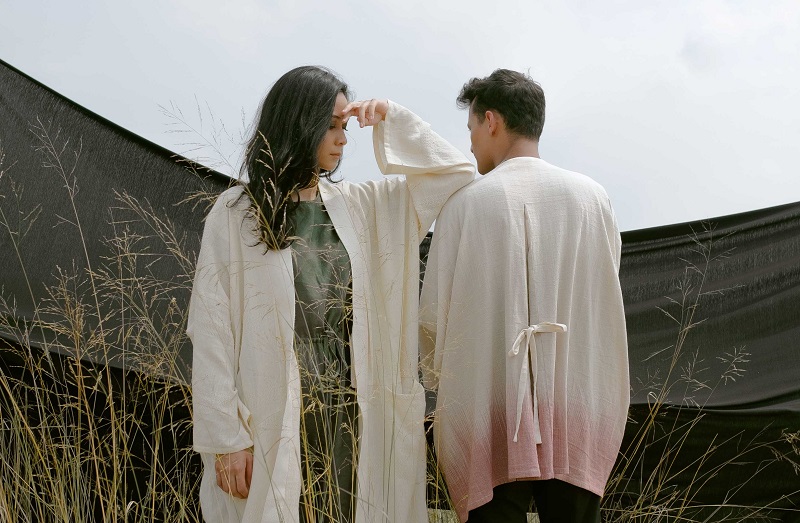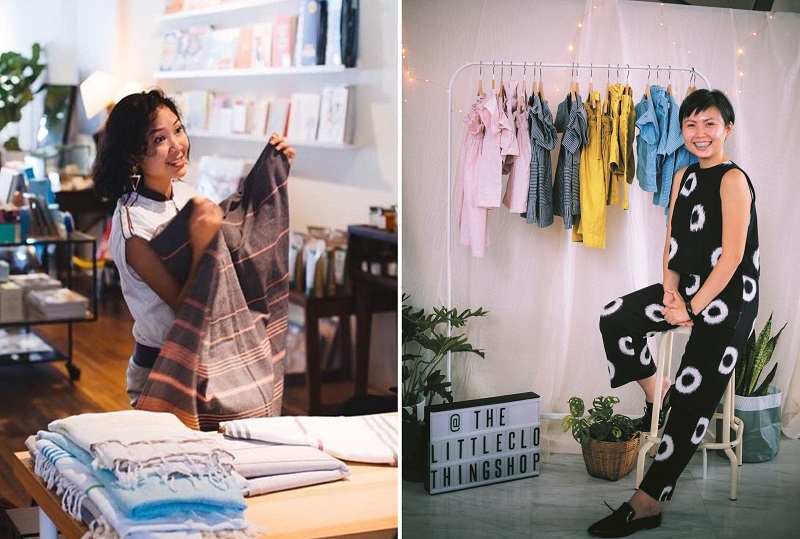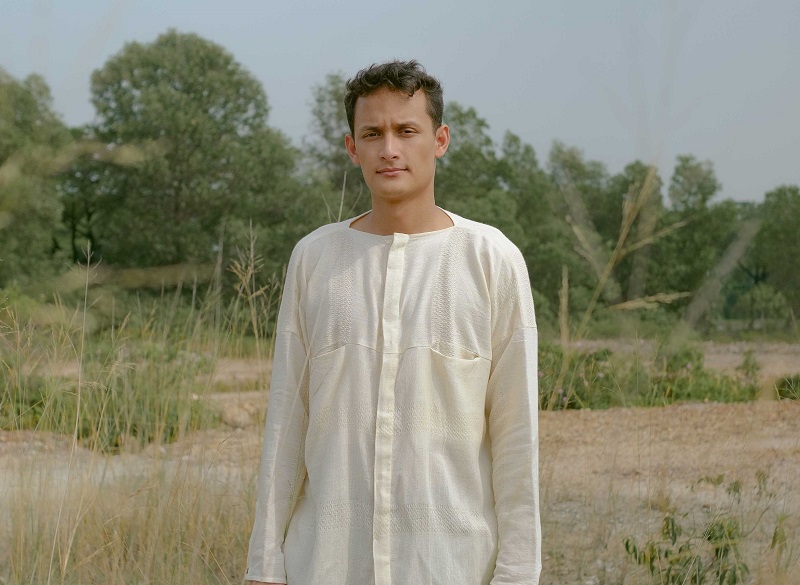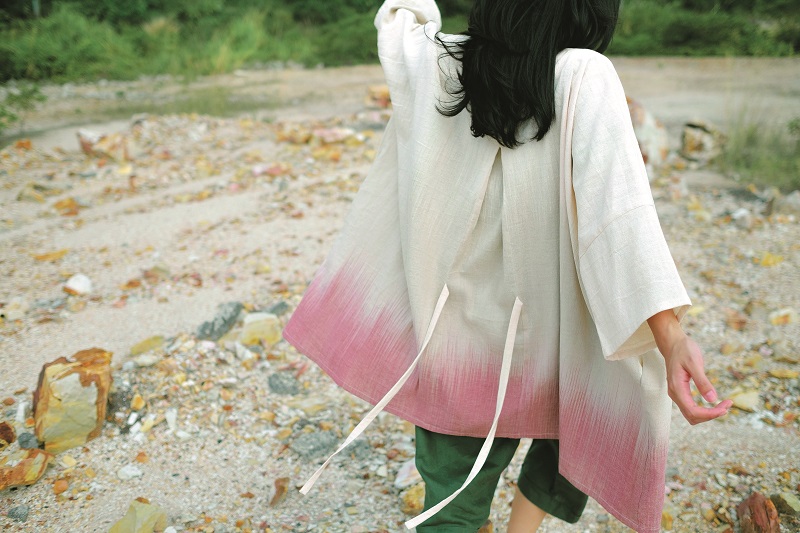
Ivory 2.0's airy, one-size-fits-all designs with splashes of colour from vegetable dyes (All photos: Real.m)
There is almost an obsession with speed these days. But is the fastest also the finest? If the moral behind Aesop’s well-known story, The Tortoise and the Hare, is anything to go by, we know that is not the case.
I sat down with Najmia Zulkarnain, co-founder of Real.m and Yeap Xe Linn, designer and owner of Little at Unplug in Bangsar Village II, on the first day of Fashion Revolution Week and the sixth anniversary of the horrific Rana Plaza disaster to talk about their new collaboration and the rise of sustainable brands.

Unplug carries a curated selection of products from selected conscious brands from all over the world and is not limited to fashion alone. “We want to convert someone’s lifestyle in stages. Think of it as a mini department shop,” says Najmia who also co-founded Unplug. She explains that the boutique was founded to address the interest in Malaysia for a retail platform fully focusing on both emerging and well-established sustainable brands.
Each brand seen here is required to fulfil at least two out of eight metrics; using environmental-friendly materials, sustainable procurement and processes, biodegradable packaging, involves zero-waste innovation, making a social impact, supporting fair trade and local products and preserving traditional skills.
“We felt that because this is a very niche and new market, it needed a space that specialises in that ... we wanted to create a retail experience to educate customers and create that presence. We have been training for generations to look at the price point and aesthetics, to buy when a deal is on, but there is not enough conversation from fashion marketers regarding the process behind it. There is a huge disconnect between retailers, supply chains and consumers because they are so blind to what they contribute to with their purchasing habits,” she says in explaining what brands such as Real.m, Little and Unplug are fighting to change.

Real.m and Little are two of the many brands found at Unplug. The former, founded by Najmia and her two sisters offers hand-loomed towels made using a 500-year-old traditional Turkish technique. “We visited two villages where all the households have handloom or semi-handloom machines and their main source of income is derived from it. For us, it is important to give back and support these businesses rather than going to the factories.”
Little, on the other hand, is literally a zero-waste brand. Its design philosophy puts many other brands — that inaccurately represent the conscious fashion element of reducing waste — to shame. The zero-waste principle that sits at its core has led Yeap to design a layout that maximises fabric, leaving no unused cloth or scraps behind — a method that took her a year to perfect.
“Going to fashion school, for me, was about learning the rules and then breaking them. How I cut now feels like breaking the rules because it does not fit the usual way that people cut,” says Yeap, who trained in fashion design at London’s Middlesex University. She admits that founding a conscious label was not her initial plan.

After graduation, Yeap who was attracted to the “glitz and the glamour and being backstage at a runway show” found that she was not interested in pursuing a career in large fashion houses. Based on her own experience, she was put off by mainstream brands that had little regard for the well-being of its employees — such as expecting interns to work for free and sometimes even fork out their own money in the course of their work — and even less so for the environment. The amount of waste it produced also troubled her.
Indeed, we are not far from the day when such fashion businesses become obsolete — and rightfully so — as more and more consumers find such labels less appealing, in no small part due to their reluctance to employ more ethical and sustainable practices. Price, however, poses an obstacle to most in switching to conscious brands.
While Najmia can appreciate this concern, she appeals to consumers to be more mindful of where they choose to spend their money. “In starting our own brands, we realised the cost of things and it makes me question how certain brands are getting a T-shirt out at RM15!” Najmia exclaims. “We get that it is production and volume but even then, it makes us wonder where they are cutting costs. Things are naturally not cheap and don’t move that fast. Something is wrong there,” she cautions.
Their latest addition to Unplug is a collection called Ivory 2.0, a collaboration between Little and Real.m. The latter had chanced upon a diagram of Yeap’s unique cutting pattern at a zero-waste store in Kepong and promptly sought her out. It merges Little’s unique fabric management approach and Real.m’s hand-loomed fabric, incorporating scraps from the debut Ivory collection. “We started off with 33kg of scraps and reduced it to about three or four kg of scraps that will be sewn into pillowcases after,” Najmia says excitedly.
Available in four designs — including long kimono outerwear and tops — each piece in this collection is unisex and available only in free size. This, they explained, is a deliberate decision taken to avoid wastage arising from excess stock but still remains inclusive owing to its clever design. The pretty colours are achieved using vegetable dyes from Indonesia instead of harsh, chemical dyes.
“When you purchase something from a conscious or sustainable fashion brand you will notice that due to the human touch, everything lasts longer,” says Yeap who runs a one-woman business at Little. Najmia — who harbours hopes for Unplug to be a launching pad for more new conscious brands — adds that “when you do things naturally, it takes time. You cannot rush nature along.”
As we have learned from Aesop’s fable, being fast does not always mean being the best. It is not known what became of the hare after the tortoise won the race but I would like to think that he may have evaluated what winning meant to him and changed his ways the next time he participated in one, or risk losing yet again.
This article first appeared on May 27, 2019 in The Edge Malaysia.


